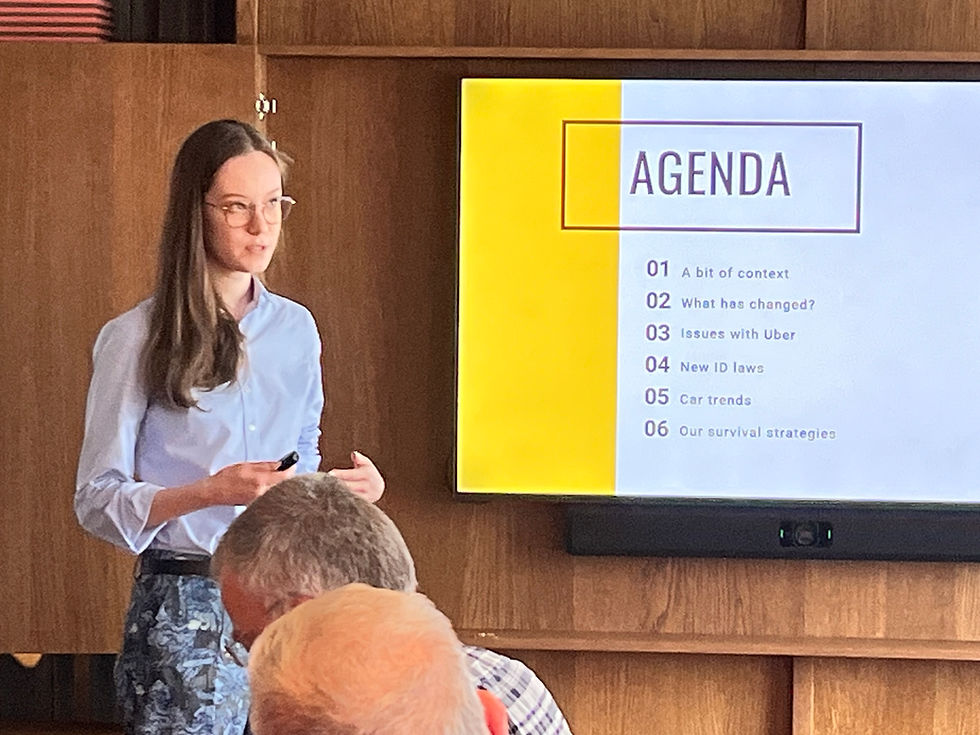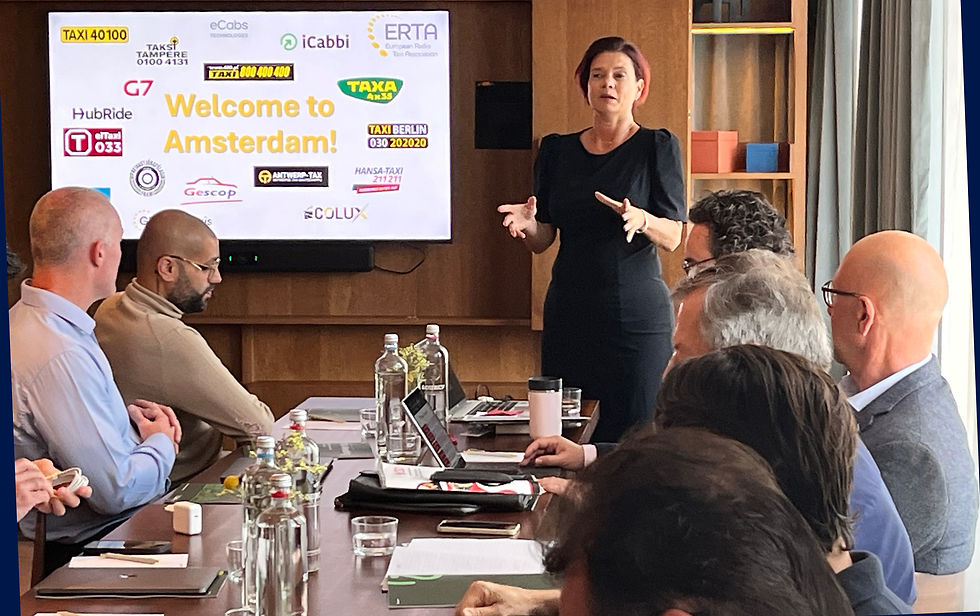There are still ‘Uber-free’ areas in Europe: Iceland and the city of Piotrkov (Poland)
- The Transportation Alliance

- Jul 8, 2025
- 5 min read
Updated: Jul 8, 2025
By: Wim Faber, Dutch Journalist and Taxi Specialist, Dutch-Belgian Magazine (Magazine Personenvervoer)

European taxi companies are choosing different paths in competition or cooperation with platforms.
Every year at the end of May, European taxi entrepreneurs meet in the only organization that functions as a meeting place for professional taxi colleagues, the ERTA, the European Radio Taxi Association (in this digital age a bit of a misnomer as name), brainchild of Britain’s taxipro Geoffrey Riesel. This time, new ERTA chairman Hedy Borreman (TCA Amsterdam) played a home game. 32 European taxi companies from 13 countries joined her in the 750-year-old city. Themes: platform competition, in connection with this, sharpened marketing and positioning in social media plus zero-emission operation, a major topic in Europe.

There is always some kind of battle in the taxi industry, wherever you look. Usually that is not without reason. A quick glance abroad: in recent weeks militant French taxi drivers have (once again) fought against platforms, which – as usual – are looking for loopholes in the law to abuse. Other French colleagues have campaigned and are campaigning for a fair compensation for NEMT, the lifeblood of taxi drivers in the French countryside.
Meanwhile, German taxi colleagues are campaigning for minimum rates for PHV’s (to break the illegal price dumping by platforms) and for fixed rates for taxis (to make their services more attractive to city dwellers). This fight culminated in demonstrations in at least 12 German cities on July 2. The German taxi sector wanted to convince local authorities to “stop looking the other way and finally take action against the illegal practices of platforms. Give us the same weapons to compete” and finally create a level playing field between the taxi sector and the platforms.
Deregulation: A Costly Mistake
Further north, in Scandinavia, the deregulation of taxis in Norway, Sweden and Finland has proven to be a costly mistake (opening the floodgates to platform operators operating illegally). The taxi sector in the three countries is jointly working on re-regulating the sector.
But that strict regulation does not always work either can be seen in Denmark, where the regulations were tailored to the taxi sector, and where Uber and Bolt simply bought taxi companies to nestle themselves within the law. Elsewhere, the platforms tried and try to enter into cooperation with taxi companies and dispatchers, pretending a win-win situation, but ultimately only looking for the taxi customer base and often a piece of the good reputation and quality of the long-established taxi companies. Taxi entrepreneurs who expect more turnover from Uber & Co. from such a collaboration are blind. Often the collaboration leads – as in Stuttgart, Germany – to enormous friction within the taxi companies. Part of the playbook.

Platform infiltration
Many European countries see Uber and Bolt infiltrating the taxi industry further, by promising more work through this 'collaboration'. For many taxi entrepreneurs that extra work sounds like progress, for many more entrepreneurs it means raising the white flag in a sell-out to the platform sector. Speaking of unrest in the taxi industry: heated internal discussions within taxi companies in Germany, Denmark, Sweden and elsewhere, lead to difficult negotiations with the platforms and to division in the taxi sector. Again, same playbook.

With taxi companies and companies that often work locally or at most regionally but rarely internationally and platforms that swim in private equity money and speak with one voice worldwide, the competition is distorted. For platforms, it is easy to find eager new partners worldwide (airlines and hotels and their mileage programs, railways, retail chains and others), to launch new programs everywhere (such as for young people, business travelers and – recently – the over-65s) and to market and advertise their services worldwide, like in the arrival halls of many major airports. This (geographical) breadth in marketing is something that a taxi company, even a large one, lacks. Cross-border taxi cooperation is not equally strong in all countries in Europe. In comparison with platforms, they are downright weak.
SWAT-Analysis
Roughly speaking, ERTA Amsterdam provided the following picture: a largely hesitant taxi sector that – often after heated internal discussions – either collaborates with platforms (the intermediate form of booking a taxi on the Uber app is also collaboration) or develops its own competitive model. The perfidious way in which the platforms try to play the taxi companies off against each other in order to profit from it, is a cynical lesson in land grabbing. But what is stopping taxi entrepreneurs from taking an example from the richly filled marketing manuals and operational experience of the platforms? Many taxi companies are now doing that – slowly but surely. This also became apparent during ERTA Amsterdam. It showed that many taxi entrepreneurs have now learned from the (electronic) practices of the platforms.
ERTA – Growing assertiveness
Compared to the platforms, the marketing and operational efforts of the taxi industry are local, often fragmented and, let's be honest, not always at the same slick and highly professional level as the well-resourced app competition. However, local taxi companies have a wealth of knowledge of their local environment, mobility habits and a large and diverse customer base that should not be wasted by supposedly 'working together' with platforms. A smart social media approach, in which the taxi driver is the hero, as illustrated at ERTA Amsterdam is a relatively easy first step to becoming more noticed in the city.

During ERTA, a growing assertiveness in the taxi sector gradually became visible. But the real urgency to take steps and coordinate them across borders was missing. For example, the Spanish representative, who works with Taxi 033 throughout Spain, warned against giving in to the marauding platforms: "Will taxis disappear from Spain? Never! Will Uber become the new taxi? Never! We see an increased demand for taxis in Spain." But not all taxi companies show this assertiveness, decisiveness and fight.
Across the board, the European taxi sector is slow to emerge from the effects of the ‘perfect storm’ of post-Covid customer loss, sluggish demand, the need for more drivers, rising taxi, parts and fuel costs, the drive for zero emissions and dormant or risk-averse regulators unwilling to adequately regulate and enforce PHV’s. The city of Berlin, Germany, showed how, under the influence of political change, vigorous enforcement and strict regulation, the number of thousands of bad illegally operating apples in the PHV basket can be halved in less than a year. Unfortunately, that same halving had already taken place on the taxi side under the previous Berlin regulator. This 3.78 million city is now served by 5.409 cabs and well over 10.000 PHV’s.

About the Author: Wim Faber, Dutch Journalist and Taxi Specialist, Dutch-Belgian Magazine (Magazine Personenvervoer)


Comments